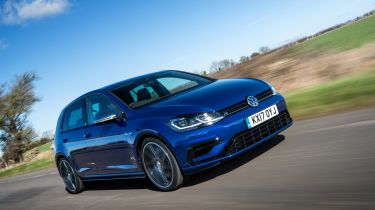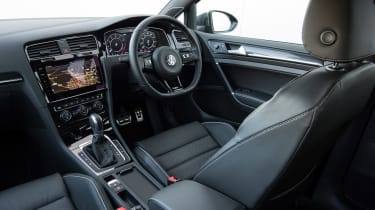Volkswagen Golf R (2013-2020) review - MPG, CO2 and Running Costs
Given its huge performance potential, the R is surprisingly cost effective to run

Considering the supercar levels of performance, fuel economy isn't bad at all. Under the most recent WLTP test procedure, the DSG auto version of the Golf R has claimed economy of up to 32.8mpg, which is a figure you can expect to achieve in real life if you're easy with the loud pedal. Emissions range from 195-197g/km.
A car capable of such pace is never going to be cheap to insure, but compared to similarly fast models the Golf R is surprisingly affordable. It helps that it comes with VW’s range of driver assistance systems that you get with the normal Golf.
Fixed-price servicing means you won’t face supercar bills, either, while predicted residuals of over 50 per cent mean the Golf R should hold on to its value well. VW also offers a range of attractive finance solutions, which include the offer of low cost servicing pack.
With a list price of around £37,000, buyers should think carefully about any options they choose for their car. If the total price of the vehicle, including any extra equipment, comes in at over £40,000, they'll have to pay a further £325 a year in VED vehicle tax on top of the standard £150 rate. This applies for years 2-6, so you'll be looking at an additional total charge of £1,625.
Insurance groups
Despite its humble hatchback origins, the Golf R is a serious piece of high-performance machinery, which means there's a higher risk of an accident in inexperienced hands, while the car's desirability means it's attractive to thieves too. As a result, the R falls into a relatively high insurance grouping of 37.
Depreciation
The combination of desirable VW badge and exceptional driving dynamics has meant strong demand for Golf R models on the secondhand market. And while the fast flagship sells in greater numbers than the GTI, our experts predict that the popular R will retain at least 50 percent of its new value after three years.




